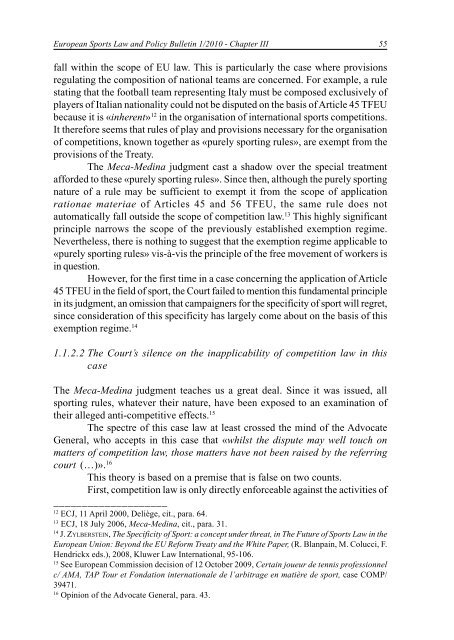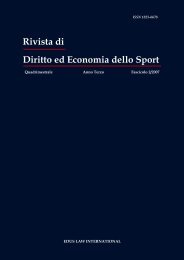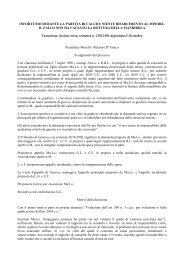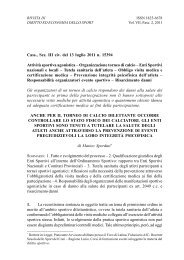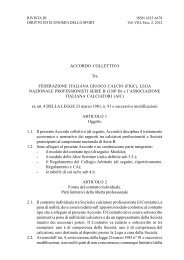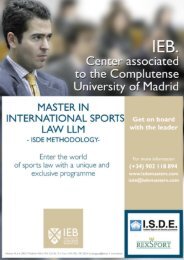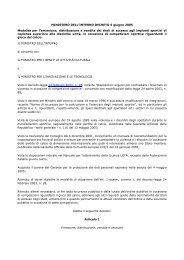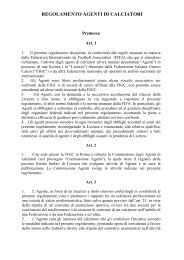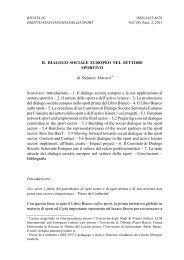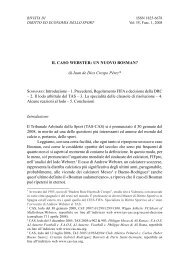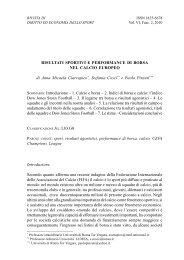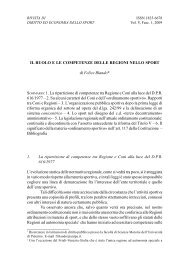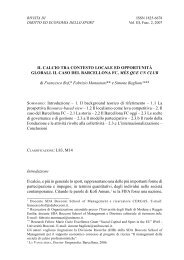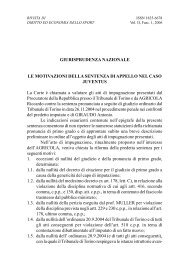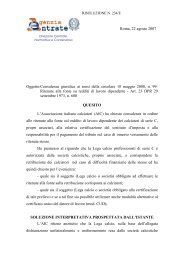European Sports Law and Policy Bulletin THE BERNARD ... - Slpc.eu
European Sports Law and Policy Bulletin THE BERNARD ... - Slpc.eu
European Sports Law and Policy Bulletin THE BERNARD ... - Slpc.eu
Create successful ePaper yourself
Turn your PDF publications into a flip-book with our unique Google optimized e-Paper software.
<strong>European</strong> <strong>Sports</strong> <strong>Law</strong> <strong>and</strong> <strong>Policy</strong> <strong>Bulletin</strong> 1/2010 - Chapter III 55fall within the scope of EU law. This is particularly the case where provisionsregulating the composition of national teams are concerned. For example, a rulestating that the football team representing Italy must be composed exclusively ofplayers of Italian nationality could not be disputed on the basis of Article 45 TFEUbecause it is «inherent» 12 in the organisation of international sports competitions.It therefore seems that rules of play <strong>and</strong> provisions necessary for the organisationof competitions, known together as «purely sporting rules», are exempt from theprovisions of the Treaty.The Meca-Medina judgment cast a shadow over the special treatmentafforded to these «purely sporting rules». Since then, although the purely sportingnature of a rule may be sufficient to exempt it from the scope of applicationrationae materiae of Articles 45 <strong>and</strong> 56 TFEU, the same rule does notautomatically fall outside the scope of competition law. 13 This highly significantprinciple narrows the scope of the previously established exemption regime.Nevertheless, there is nothing to suggest that the exemption regime applicable to«purely sporting rules» vis-à-vis the principle of the free movement of workers isin question.However, for the first time in a case concerning the application of Article45 TFEU in the field of sport, the Court failed to mention this fundamental principlein its judgment, an omission that campaigners for the specificity of sport will regret,since consideration of this specificity has largely come about on the basis of thisexemption regime. 141.1.2.2 The Court’s silence on the inapplicability of competition law in thiscaseThe Meca-Medina judgment teaches us a great deal. Since it was issued, allsporting rules, whatever their nature, have been exposed to an examination oftheir alleged anti-competitive effects. 15The spectre of this case law at least crossed the mind of the AdvocateGeneral, who accepts in this case that «whilst the dispute may well touch onmatters of competition law, those matters have not been raised by the referringcourt (…)». 16This theory is based on a premise that is false on two counts.First, competition law is only directly enforceable against the activities of____________________12ECJ, 11 April 2000, Deliège, cit., para. 64.13ECJ, 18 July 2006, Meca-Medina, cit., para. 31.14J. ZYLBERSTEIN, The Specificity of Sport: a concept under threat, in The Future of <strong>Sports</strong> <strong>Law</strong> in the<strong>European</strong> Union: Beyond the EU Reform Treaty <strong>and</strong> the White Paper, (R. Blanpain, M. Colucci, F.Hendrickx eds.), 2008, Kluwer <strong>Law</strong> International, 95-106.15See <strong>European</strong> Commission decision of 12 October 2009, Certain jou<strong>eu</strong>r de tennis professionnelc/ AMA, TAP Tour et Fondation internationale de l’arbitrage en matière de sport, case COMP/39471.16Opinion of the Advocate General, para. 43.


